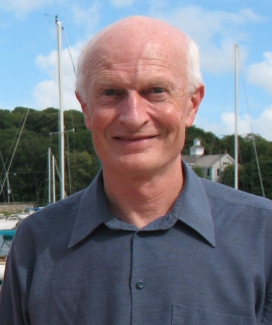Michael Patrick Sheetz
With deep sadness, the MBL notes the passage of Michael Patrick Sheetz on January 30. Sheetz was a distinguished visiting investigator at the MBL, most noted for his landmark co-discovery of the motor protein kinesin at the MBL in the mid-1980s. He also served on the faculty of the Physiology course (1983, 2010, 2011) and the Neurobiology course (1986-1989) and was a former member of the MBL Society. The MBL flag will be lowered in his memory.
An obituary is published here and reprinted below.
Michael Patrick Sheetz
December 11, 1946 - January 30, 2025
GALVESTON, TEXAS - Michael Patrick Sheetz passed away on January 30th after living nearly eleven years with multiple myeloma. A service of sharing will be held at 6 pm Wednesday, February 5th at Carnes Brothers Funeral Home. Visitation will begin at 5 pm at the funeral home.
Mike was born in Hershey, Pennsylvania in 1946; his family moved to Lincoln, Nebraska when he was five so his father could pursue a PhD in Chemistry leading to an executive position at Dow Chemical Company. Mike earned his undergraduate degree in Math and Chemistry from Albion College in Michigan and then completed a PhD at Cal Tech and a post-doc at UCSD. His early work is still highly cited. After holding positions at UConn Health Center (where he ran the Red Hen Chicken Farm), and Washington University in St. Louis, he served as Chair of Cell Biology at Duke University from 1990 to 2000. He then held a professorship in Biological Sciences at Columbia University where he also served as Chair. The National University in Singapore recruited him to be the founding director of the Mechanobiology Institute which he led for ten years.
Mike’s life passion was science, and he remained an original and highly productive scholar until his dying day, traveling around the world and renowned throughout the international scientific community. He was most famous for having discovered kinesin, for which he won Lasker, Wiley and Massry Prizes. He supervised many Ph.D. students and postdocs. The Mechanobiology Institute in Singapore was the first of its kind in interdisciplinary science. Continually reinventing himself, Mike was remarkable in his ability to move into a field and influence it with radically new findings, applying chemistry and engineering approaches to biology. He recently received a $6M grant from the State of Texas Cancer Prevention and Research Foundation (CPRIT) to study how the loss of rigidity sensors he discovered enabled cancer cell growth in the hopes of obtaining a novel cancer cure.
His notion that cells could respond to mechanical stress was revolutionary. Serendipitously, a post-doc studying senescence used low frequency ultrasound (LFU) to treat senescent (aging) cells and stimulated growth. Their manuscript is now in press in Aging Cell. A phase I clinical trial for treating osteoarthritis patients has just finished, a phase II application is pending and an Alzheimer’s clinical trial awaits approval. With his microbiologist wife, Linda Kenney, he collaborated on a study of aged mice infectivity and a study of Parkinson’s mice is currently underway. LFU has enormous potential to transform human health.
Mike was an avid hiker, naturalist, and birding photographer. Mike is survived by his wife Linda, a brother Matthew (Nicole) and a sister Martha Keep (John). Three children, Jonathan (Kate), Jennifer (Christopher) and Courtney (Justin), and grandchildren Mikaere, Aquinnah, Anaru, Althea, Gideon, Xesca, and Kai. In lieu of flowers, please plant a tree.
